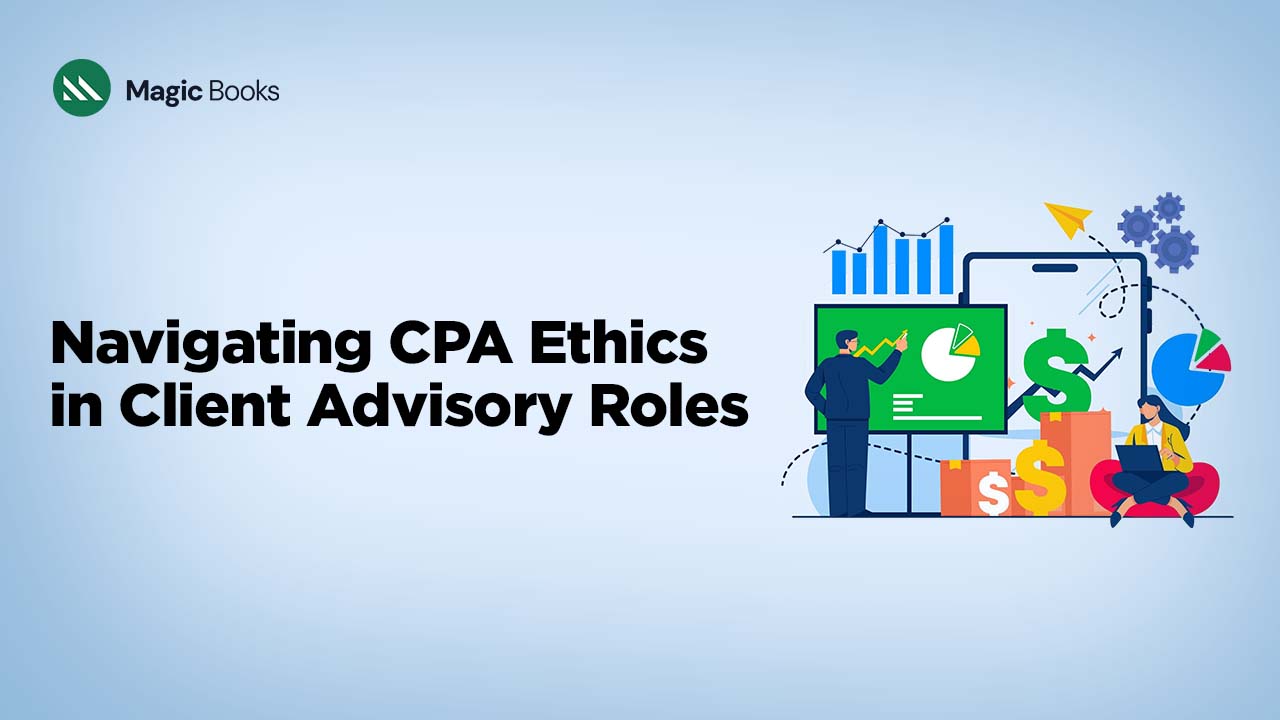“Four in ten employees say they have faced an ethical dilemma at work.” That comes from the AICPA Business Ethics Survey, and it tells us something important about professional practice today. For CPAs providing advisory services, ethics protects client trust, maintains your professional reputation, and keeps you clear of regulatory trouble.
Client advisory work creates its own set of ethical challenges. They differ from what you encounter in traditional compliance or attest engagements, sometimes in ways that aren’t immediately obvious. When you advise clients on strategy, tax planning, or operational decisions rather than verifying what already happened, the ethical space shifts. You’re influencing what comes next, not just reviewing what came before. That changes everything.
What “CPA Ethics” Means in Client Advisory Roles
The AICPA Code of Professional Conduct lays out five core principles for all CPA work. Integrity means you’re honest with clients while respecting confidentiality. Objectivity requires that you stay free from conflicts of interest. Professional competence and due care mean keeping your knowledge current and applying it carefully. Confidentiality protects the sensitive information clients share with you. Professional behavior upholds the reputation of the entire profession, not just your own practice.
These principles work straightforwardly in traditional compliance work. Tax return preparation and financial statement audits have clear boundaries and specific technical requirements. There’s still judgment involved, but the role itself is well-defined. Advisory engagements are different.
When you provide strategic business advice, guide cash flow decisions, or recommend internal control improvements, you balance technical expertise against client goals. Those goals might not always align perfectly with the cleanest tax or accounting treatment. The relationship becomes an ongoing dialogue rather than periodic check-ins. Clients expect you to go beyond technical analysis. They want help navigating business challenges that have financial dimensions. That expanded scope means you need constant vigilance to protect your objectivity, especially if you also do attest work for the same client.
Key Ethical Risks Unique to Client Advisory
Conflicts of interest are probably the most pervasive challenge in advisory work. Most CPAs serve multiple clients in the same industry or deal with related parties in complicated business structures. When you advise one client on a transaction involving another client, or even a potential client, you must recognize that conflict and figure out whether you can manage it adequately. Sometimes informed consent and information barriers work. Sometimes they don’t. Disclosure obligations require you to be transparent about these relationships before they turn into violations.
Independence and objectivity get especially tricky when your firm provides both advisory and attest services to the same client. The SEC has updated its auditor independence rules to address situations where certain advisory services at portfolio companies or affiliate entities can impair independence. These services might seem pretty remote from the audit engagement itself, but they still matter. You can have technical independence violations without any actual bias occurring. They still require careful navigation and often mean you need to consult with regulatory staff or the client’s audit committee.
Client pressure to bend the rules shows up differently in advisory relationships. Advisory clients see you as part of their team, not as an independent verifier. Recent data shows that nearly one in four accountants have faced pressure to act unethically in the past three years. Forty percent point to weaknesses in company leadership and culture as the root cause. The pressure often comes in subtle forms. Implicit expectations to find aggressive tax positions. Suggestions to frame business structures in ways that prioritize form over economic substance.
Confidentiality obligations intensify in advisory work. You get access to strategic plans, competitive information, and operational details that go way beyond the financial data you see in compliance engagements. Role creep is another real risk. It happens gradually. Clients start expecting you to make decisions rather than advising on options. Suddenly you’ve crossed from consultant to de facto management. Compensation and referral arrangements create financial incentives to recommend particular products or services. Those can bias your professional judgment even when you genuinely believe your objectivity stays intact.
Regulatory and Enforcement Landscape
Multiple regulatory bodies oversee CPA ethics. This creates an environment where you need to understand overlapping jurisdictions and sometimes conflicting standards. The AICPA Code of Professional Conduct sets the baseline ethical standards for all members. The Professional Ethics Division interprets and enforces those standards. Violations potentially result in anything from remedial education to expulsion from membership. State boards of accountancy license CPAs and have their own enforcement authority. That authority may exceed AICPA requirements depending on where you practice.
The PCAOB conducts inspections and enforcement for audit firms examining public companies or broker-dealers. Their recent inspection results showed that 39 percent of audits in 2024 contained significant deficiencies. That’s down from 46 percent the year before, which is progress. It still indicates persistent quality control challenges across the profession. PCAOB findings frequently identify ethical lapses tied to insufficient professional skepticism or inadequate documentation.
The SEC enforces auditor independence rules through Regulation S-X Rule 2-01. They’ve updated it to address modern business structures including private equity portfolio companies and lending relationships that technically violate independence without impairing objectivity. NASBA and state boards publish quarterly enforcement reports documenting disciplinary actions against individual CPAs. Those reports offer valuable insight into what conduct triggers sanctions.
For tax work, IRS Circular 230 governs practice before the Internal Revenue Service. It establishes standards for written tax advice and prescribes penalties for incompetent or disreputable conduct. Tax practitioners need to understand both the AICPA Code and Circular 230. Violations of one may constitute violations of the other. The IRS Office of Professional Responsibility has independent authority to suspend or disbar practitioners from representing clients before the IRS.
Practical Compliance Steps
Start with written conflicts policies that require systematic checking of new engagements against existing client relationships before you accept the work. Build in clear protocols for obtaining informed consent when conflicts exist that you can manage through safeguards. Independence and engagement-scoping checks need to happen at engagement acceptance and then periodically throughout long-term advisory relationships. The nature or scope of services can evolve in ways that create independence concerns you didn’t have when you started.
Document everything you do. Contemporaneous memos of advice serve two purposes. They demonstrate your professional judgment process if it’s ever questioned. They also clarify for clients what you advised versus what they ultimately decided to implement. Secure data handling and documented client consents for information sharing become necessary when you serve related parties or when engagement teams need access to confidential information.
Get targeted ethics CPE beyond the minimum hours required for license renewal. It helps you recognize ethical issues before they escalate and gives you tools for resolving problems when they arise. Establish escalation procedures so individual practitioners know when and how to seek guidance from firm leadership, ethics officers, or external consultants when they face pressure or uncertainty. Most state boards require at least two hours of ethics training per renewal period. The specifics vary by jurisdiction.
Firms should have clear guidelines for when to obtain third-party legal or compliance consultation. This matters particularly for novel situations involving complex independence questions, potential conflicts in multi-party transactions, or situations where client pressure to take aggressive positions creates significant professional risk. Having established relationships with legal counsel who understand accounting ethics means you can get timely consultation before positions become entrenched.
Decision-Making Framework for Difficult Situations
When you confront an ethical dilemma, apply a systematic framework. First, identify all your professional obligations under the AICPA Code, state board rules, and any other applicable regulatory standards. Then consult the specific Code sections and interpretations relevant to your situation. Look at enforcement guidance from NASBA or state boards addressing similar facts. Document your analysis. Write down the alternatives you considered and the basis for the conclusion you reached. Create a contemporaneous record that demonstrates professional judgment.
Escalate matters within your firm or to external advisors when the situation involves significant regulatory risk. Do this when client pressure persists despite your initial pushback or when you lack experience with similar circumstances. Sometimes you cannot establish adequate safeguards. Or the client refuses to accept your conclusions on material matters. In those cases, you need to decline the engagement or withdraw from the existing relationship. This happens even when it creates business disruption or damages client relationships. Professional ethics sometimes requires accepting short-term negative consequences to maintain long-term integrity and compliance.
Resources and Authoritative Reading
If you navigate advisory ethics, several authoritative resources deserve regular consultation. The AICPA maintains comprehensive online resources including the complete Code of Professional Conduct and ethics-related technical Q&As. AICPA The PCAOB publishes inspection reports and enforcement actions that reveal common deficiencies and compliance failures. These reports help you see what actually goes wrong in practice.
NASBA provides enforcement tools and quarterly reports documenting state board disciplinary actions. For tax practitioners, the IRS Office of Professional Responsibility publishes Circular 230 and related guidance. The SEC maintains current auditor independence rules and releases explaining regulatory expectations. SEC Industry surveys from organizations like ACCA report on ethical pressure trends and emerging compliance challenges. This gives you context for what other practitioners experience.
Streamline Your Practice Management
MagicBooks provides CPAs and financial advisors with curated ethics and practice management briefings that integrate with your workflow. We help you stay current on regulatory developments and compliance best practices through templates, checklists, and guidance designed for accounting professionals navigating the complex intersection of advisory services and professional ethics.



